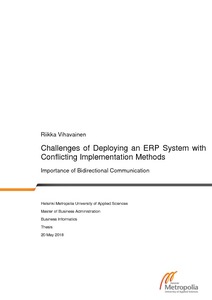Challenges of Deploying an ERP System with Conflicting Implementation Methods : Importance of Bidirectional Communication
Vihavainen, Riikka (2018)
Vihavainen, Riikka
Metropolia Ammattikorkeakoulu
2018
All rights reserved
Julkaisun pysyvä osoite on
https://urn.fi/URN:NBN:fi:amk-2018053011392
https://urn.fi/URN:NBN:fi:amk-2018053011392
Tiivistelmä
The case company studied in this Master’s thesis went through a major reorganization in the company structure. For the reorganization, the case company required tools to run the business for a new company that was to be divided from the original case company. One of the required tools was an enterprise resource planning (ERP) system. This thesis presents the phases of that ERP system project in a project report form, from finding and choosing the service provider, to deploying the new system.
The project was part of a lengthier development entity. This makes the project report also a part of continuum and one cycle of an action research. Firstly, the theory on information technology (IT) projects and different styles of IT project implementations were examined, which formed the data of the existing knowledge. Furthermore, the company’s management team and project’s core team members were interviewed regularly during the six-month project. In addition, notes were taken of project meetings, and during the actual implementation and testing phase a diary type memo was written daily. These interviews and notes formed the research data for this thesis. Finally, the existing knowledge and the project implementation were analyzed to discover learning points for further projects.
The ERP project was a success when looking at the end result. The new company had a functioning system to run their business operations from the first day of their existence, as planned. However, one common development objective that was stated by all interviewees was communication. In addition, the schedule was agreed to have been challenging and rigid. There was only a three and a half months’ period from the signing of the contract to being in production with a functioning system. However, the committed and responsible group of people and their outstanding work morale contributed to getting the required job done on time.
In conclusion, the author raises some learning points from the project, e.g. openness in the project being an important one. Openness is important bidirectionally in three ways; between the case company and the consultant company, between the internal IT team and the project core team, and between the consultant company and the internal IT team. In addition, the interdependent tasks within the project and also around the project could have been taken into consideration more thoroughly when planning the ERP project and the reorganization of the company structure.
The project was part of a lengthier development entity. This makes the project report also a part of continuum and one cycle of an action research. Firstly, the theory on information technology (IT) projects and different styles of IT project implementations were examined, which formed the data of the existing knowledge. Furthermore, the company’s management team and project’s core team members were interviewed regularly during the six-month project. In addition, notes were taken of project meetings, and during the actual implementation and testing phase a diary type memo was written daily. These interviews and notes formed the research data for this thesis. Finally, the existing knowledge and the project implementation were analyzed to discover learning points for further projects.
The ERP project was a success when looking at the end result. The new company had a functioning system to run their business operations from the first day of their existence, as planned. However, one common development objective that was stated by all interviewees was communication. In addition, the schedule was agreed to have been challenging and rigid. There was only a three and a half months’ period from the signing of the contract to being in production with a functioning system. However, the committed and responsible group of people and their outstanding work morale contributed to getting the required job done on time.
In conclusion, the author raises some learning points from the project, e.g. openness in the project being an important one. Openness is important bidirectionally in three ways; between the case company and the consultant company, between the internal IT team and the project core team, and between the consultant company and the internal IT team. In addition, the interdependent tasks within the project and also around the project could have been taken into consideration more thoroughly when planning the ERP project and the reorganization of the company structure.
